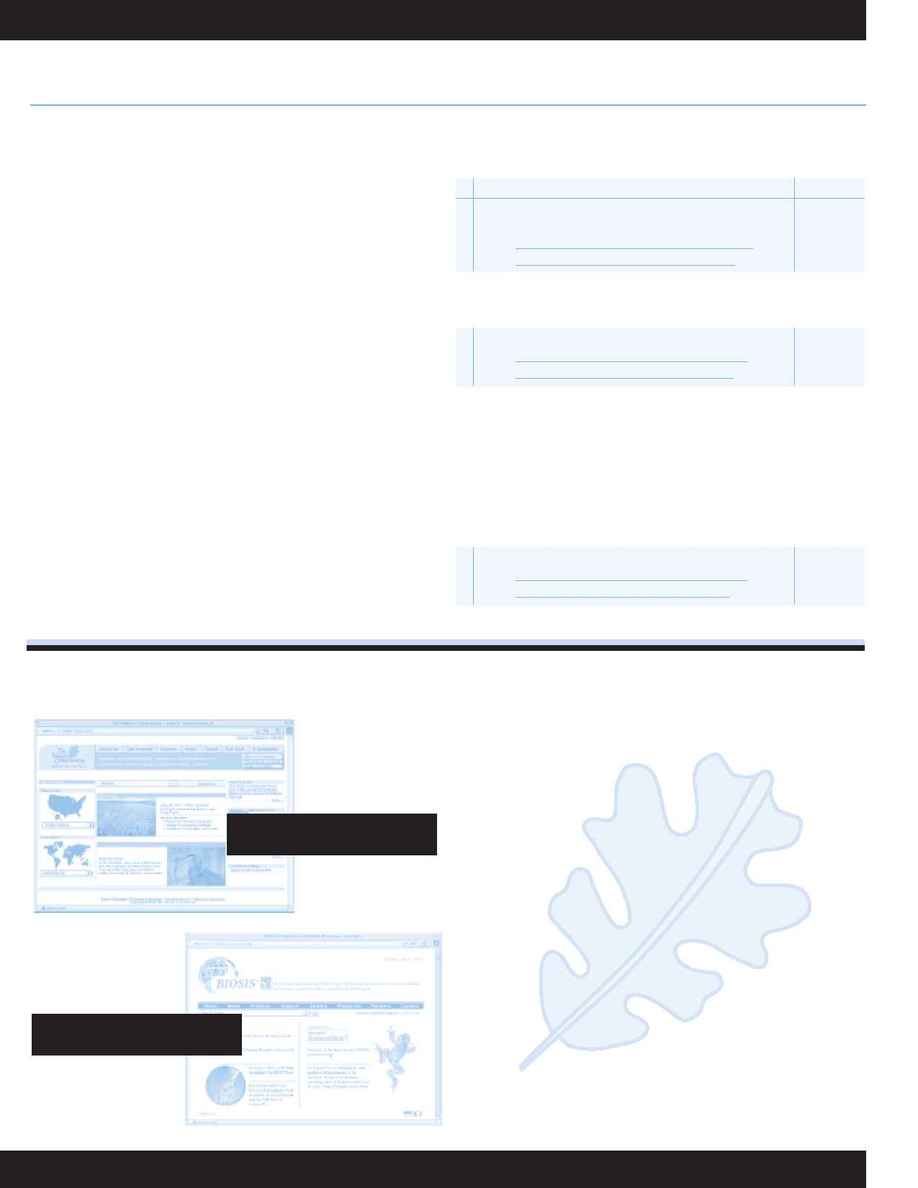
4
www.biosis.org
Vol. 8 Issue 4 2001
BIOSIS Evolutions
The Nature Conservancy's scientists worldwide can now locate
research with new levels of accuracy and efficiency using
BIOSIS Previews and Zoological Record. BIOSIS Previews is
updated weekly, and collects citations from over 5,500 information
resources worldwide. And, as the premier resource for animal
science research, Zoological Record collects crucial research from
over 100 countries, so that Conservancy scientists can be certain
to get information, even if they are studying ecosystems outside
of Europe or North America. Both of these BIOSIS
databases have extensive international coverage, an important
factor for a global organization like The Nature Conservancy.
The Nature Conservancy (www.nature.org), a leading
environmental conservation group, takes great pride in basing
its policy on hard science. With information from BIOSIS, the
Conservancy will have the benefit of looking at current,
comprehensive, international information when making decisions
to help save threatened species the world over.
For more information on BIOSIS Previews or Zoological Record,
visit our Web site: www.biosis.org.
s
Non-Profits Join Up: The Nature Conservancy Signs on With BIOSIS
www.nature.org
www.biosis.org
Can one search query answer all your research questions? It's
rarely that easy. Cross-database searches can make it easier to
collect data quickly, and can underline the ways one database
differs from another.
Medline and BIOSIS Previews, for instance, cover somewhat
different subject areas, and even different data sources. While
Medline concentrates on coverage of clinical medicine, BIOSIS
Previews encompasses a wider scope of life sciences, and focuses
on experimental and pre-clinical research. It also indexes
scientific meetings, review literature, and US patents. By
searching both these databases at once, you can collect more
information quickly, and get a side-by-side look at how the
databases compare to one another.
Included here is a multiple database search on genetic factors
linked to lung cancer, more specifically, gene expression in cases
of squamous cell carcinoma. The search example below was
done on the Ovid platform.
Ovid gives you the option of searching up to five databases at
once. After first logging in to Ovid, your first option will be to
choose a single database, or click on the tab at the top right-
hand side of the page if you want to choose more than one. For
this example, we chose this second option, and picked two
databases: BIOSIS Previews, 1970 2001 (week 26), and
Medline, 1966 2001 (July, week 2).
To further narrow the search, we can specify an additional term.
Here, we included the term adenocarcinoma:
Removing duplicate records is a useful feature if you want to
further trim the results set. Clicking on the "Remove duplicates"
button directly below the search history window removes these
records. They can still be viewed by clicking on the "Review
duplicates" button to the right of the "Display" column of the
search history window. This is useful if, for instance, you wish to
see how the two databases index the same record differently.
s
S
EARCH
T
IPS
2
FOR
1 - C
ROSS
-F
ILE
S
EARCHING
S
AVES
T
IME
, I
INCREASES
R
RESULTS
#
Search History
Results
1 ("squamous cell carcinoma" and "gene expression").mp.
687
[mp=ti, kw, hw, rw, ab, bc, bt, bo, sh, dz]
BIOSIS Previews <1970 to 2001 Week 26> (368)
MEDLINE <1966 to July Week 2 2001> (319)
2 1 and adenocarcinoma
88
BIOSIS Previews <1970 to 2001 Week 26> (49)
MEDLINE <1966 to July Week 2 2001> (39)
3 remove duplicates from 2
71
BIOSIS Previews <1970 to 2001 Week 26> (49)
MEDLINE <1966 to July Week 2 2001> (22)
See sample records on page 5.
